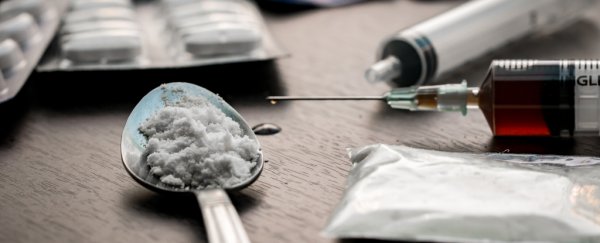Drug overdoses in the US are feared to have caused more than 60,000 deaths in 2016, but new vaccines that make the brain immune to mind-altering chemicals could be the key to ending the opioid crisis.
A combination vaccine that offers protection from the effects of both heroin and the synthetic opioid fentanyl is under development by researchers in the US, which could one day help curb addiction and even possibly prevent fatal overdoses.
The findings, presented last week at a meeting of the American Chemical Society (ACS) in Washington, DC, are the latest developments in a long-researched and controversial approach to treating addiction – using vaccines to effectively neuter drugs' effects.
But while such investigations date as far back as the 1970s, researchers say the recent rise of synthetic opioids means vaccines to counter drugs' powers could be more important than ever.
"There is an urgent need to discover effective medications to treat substance use disorders," says chemist Kim D. Janda from the Scripps Research Institute in California.
"Increasingly, drug users are turning to opioids and powerful synthetic versions of these drugs that can sometimes be as much as 100 times more potent than heroin. Moreover, many patients [are] receiving treatment relapse."
The problems posed by these synthetic substitutes and supplements are various. Not only are they cheaper to manufacture, but they can be produced far more quickly than conventional drugs like heroin.
Worse still, they can be incredibly powerful – with reports of black market opiates that are up to 10,000 times more powerful than morphine.
In the case of fentanyl – which is up to 100 times more powerful than morphine – it's a dangerously cheap and accessible substitute that ends up getting cut with heroin.
"It's an economics thing," Janda told Dave Roos at Seeker.
"They start putting in things like fentanyl, because it's much more potent and inexpensive. We'll see more problems going forward, simply because it takes a couple of months to grow poppies, but it only takes a couple of days to make the synthetic opioid."
One of the difficulties with developing vaccines to counter these kinds of drugs is that the opioids are made up of tiny molecules that the body's immune system doesn't recognise, and so doesn't do anything to fight against them.
To encourage that defensive reaction, Janda's team designed small molecules called haptens that resemble the opioid molecules, but with proteins attached called epitopes that act as a binding site for antibodies produced by the immune system.
Once an immune system is trained up with a series of vaccination shots, it will learn to recognise molecular structures that look like opioids thanks to exposure to these beckoning proxies – and will send out antibodies that cling to the drugs, preventing them from crossing the blood-brain barrier for up to eight months.
"The antibody binds to the drug so the drug can't get to the target," Janda explained.
The new research has so far been conducted on mice and monkeys and hasn't been peer-reviewed yet – so we should bear that in mind, until more is known about how effective this approach could ultimately be in vaccinating humans against heroin and opioids.
But the results build upon former work by the team separately vaccinating rhesus monkeys against heroin and mice against fentanyl, and the researchers hope the combined approach could one day help protect humans from the effects of these dangerous opioids.
Better still, because the same receptors in the brain that signal pleasure in response to opioids are the ones that can depress breathing in high doses of drugs, it's possible the vaccine could reduce deaths from overdoses – a result the animal research suggests.
To that end, the team hopes to begin clinical trials investigating how their molecule works in humans.
If they're successful, it could one day be a huge assist to psychology-based interventions treating addiction – provided people truly want to give up their habit, that is.
"Vaccines are meant to be used by people who want to quit taking drugs," Janda explained to Philip Ball at The Guardian.
"If you don't want to stop then nothing will help. The idea is that if they have a moment of weakness, they won't relapse and can continue with their therapy."
